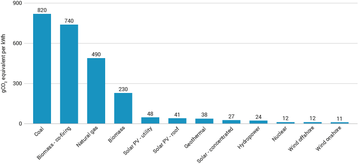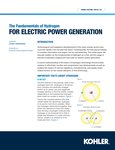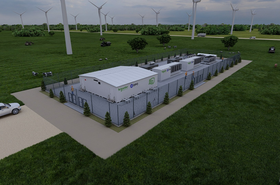At DCD, we often hear data center providers claiming their backup power is green - because it's provided by natural gas.
We've heard a lot of detailed explanations for this claim. And we aren't convinced. We understand that natural gas emits less greenhouse gas per kWh of energy than coal or oil. But it still emits too much carbon to ever properly be classified as green.
Operators claim it's an interim step to net-zero, but we are not convinced of that, either. As long ago as 2015, a study published in Nature, said that half the world's gas reserves, along with most of the world's coal, must be left in the ground, if we are to have a chance of keeping the global temperature increase below 2oC.
Unless you have a very good reason, you should not be burning natural gas.
Gaseous greenwash
Let's start with some figures. According to the US Energy Information Administration (EIA), electricity generated from coal in the US produces about 1kg (2.26lb) of CO2 per kWh, while electricity from oil produces about 1.1kg (2.46lb). Compared to that, electricity from natural gas produces 430g (0.92lb) of CO2 per kWh.
For the same energy, gas produces less than half the emissions of coal or oil, because it's pretty much pure methane. It has a high energy content, and it also doesn't have contaminants like water and sulfur, which reduce the heat produced from coal and oil.
Global figures are slightly different, but coal, oil, and gas produce much more emissions per kWh than alternatives. Figures for the lifecycle emissions cost of different options from the World Nuclear Association suggest that solar emits 48g/kWh, wind 12g/kWh, and nuclear 12g/kWh.
When someone tells you natural gas is green, remind them it has more than ten times the emissions of solar, and 40 times the emissions of wind or nuclear.
Despite this, natural gas is often presented as a "green" option, often as a way to "get a few steps closer" to a net-zero.
For instance, in 2021, the EU classified natural gas power plants as a sustainable investment. It did this after extensive lobbying from the oil industry and Eastern European countries, and over the objections of environmentalists, and nations such as Denmark and Spain.
The argument goes that encouraging gas investments will help those reliant on coal or nuclear to shift to a lower-emission power source. And the EU regulations say "sustainable" gas plants must have a lower emission level - some 270g of CO2 per kWh - and their operators should have a plan to close them down by the end of 2035.
To my mind, this is like an alcoholic with serious medical symptoms, who has been warned that drink will kill him, but carries on drinking because at least he isn't using heroin. Look, he's also trying to cut down, he's not drinking spirits much, and he doesn't drink in the morning.
People who say natural gas is a green option, are in denial. Frankly, I think these are people who need help.
Slippery slope
Like alcohol addiction, natural gas addiction is something that can escape your control.
Data center operators will initially opt for it to reduce emissions from a tiny part of their operations like backup. Natural gas generators have become a popular alternative to diesel generators, and produce less emissions for the few hours during which they are used. There is even a possibility that they might eventually switch to hydrogen, although there is little sign of hydrogen distribution taking off soon.
Fuel cells are perhaps more attractive, as they look cleaner, and have a smooth upgrade path to hydrogen if the distribution network arrives.
But we are now starting to see natural gas generators and fuel cells to be used as a primary energy source, not just for backup. AWS wants to power at least three data centers in Oregon with Bloom fuel cells - using the fuel cells as a primary energy source rather than backup. This means that those data centers will be running on fossil fuel, instead of on electricity which might have been delivered on a green tariff.
Some argued that this represented a "breakthrough." To me, it looks more like an addict increasing their habit, rather than facing up to the fact that there simply wasn't enough clean energy there to justify the new facilities.
In Dublin, Microsoft is adding a 170MW gas plant to a data center campus, in order to meet demands that it should rely less on an over-stretched grid. It's not clear whether this is just for backup, or for primary power, but there are reports that 11 data centers in Dublin are being planned which burn natural gas on-site for power, despite the government's efforts to close the loophole which allows this.
Data centers that are powered by natural gas are not helping the environment - unless they can show that they provide some well-documented, overriding benefit that compensates for the emissions they produce from the natural gas they burn.
Because fossil methane gas may be "natural," but it isn't green.








